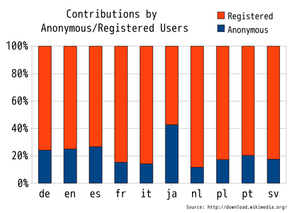Japanese Wikipedia
 | |
|
Screenshot
Mainpage of the Japanese Wikipedia. | |
Type of site | Internet encyclopedia project |
|---|---|
| Available in | Japanese |
| Headquarters | Miami, Florida |
| Owner | Wikimedia Foundation |
| Website | ja.wikipedia.org |
| Commercial | No |
| Registration | Optional |
| Launched | May 11, 2001 |
The Japanese Wikipedia (ウィキペディア日本語版 Wikipedia Nihongo-ban, literally "Wikipedia: Japanese-language version") is the Japanese-language edition of Wikipedia, a free, open-content encyclopedia. Started on 11 May 2001,[1] the edition attained the 200,000 article mark in April 2006 and the 500,000 article mark in June 2008. As of December 2016, it has over 1,042,000 articles.[2] In April 2016, the project had 4,192 active editors who made at least five edits in that month, ranking fourth behind the English, Spanish and Russian editions.
History
In March 2001, three non-English editions of Wikipedia were created, namely, the German, the Catalan, and the Japanese Wikipedias.[3] The original site address of the Japanese Wikipedia was http://nihongo.wikipedia.com and all pages were written in the Latin alphabet or romaji, as the software did not work with Japanese characters at the time. The home page also showed an early attempt at creating a vertical text.[4]
The first article was named "Nihongo no Funimekusu". Until late December in that year, there were only two articles.
Expansion
On January 31, 2003, a Japanese online magazine, Wired News Japanese edition, covered Wikipedia. After that, the number of participants started to increase considerably and many pages about the Wikipedia project were translated or created.
On February 12, 2003, the Japanese edition of Wikipedia reached the 1,000-page milestone, two years after the English edition. Given that accomplishment, Slashdot Japan posted a story about the Japanese Wikipedia. Several days after that, the number of participants doubled, attesting to the power of the Slashdot effect. Because of this exposure, a variety of articles started to appear, among them physics, biology, information technology, literature, music, games, manga, and celebrities.
On July 15, 2003 the Japanese Wikipedia reached 10,000 articles, four months and three days after the 1,000-article milestone, beating the time it took the English Wikipedia to achieve the same feat. By early 2004 the Japanese Wikipedia contained 30,000 articles. The increase in both articles and contributors was steady after that, and by late September it had reached 75,000 articles.
The major force behind the expansion appeared to be a number of links at Yahoo! Japan News. It is unknown exactly when Yahoo! started to put links to the edition in their articles, but as of August 2004, dozens of news articles posted on Yahoo! Japan contained links to the edition to explain terms in the articles. Lately, the developers of Wikipedia have noticed that certain spikes in server usage correspond to the publishing of Yahoo! Japan news articles containing links to Wikipedia.
Awards
In September 2004, the Japanese Wikipedia was awarded the "2004 Web Creation Award Web-Person Special Prize"[5] from the Japan Advertisers Association.[6] This award, normally given to individuals for great contributions to the Web in Japanese, was accepted by a long-standing contributor on behalf of the project.
Characteristics
The Japanese Wikipedia is different from this English Wikipedia in a number of ways.
- An edit is kept only if it is legal under both Japanese and United States laws, to account for the fact that the vast majority of contributors live in Japan. This has two major consequences:
- The fair use provisions of US law are not considered to be applicable. Articles and media files which do not have a GFDL-compatible license are prohibited, even if they would be legal under the "fair use" doctrine in the US.
- Materials considered illegal cannot be kept in the archive, even reverted by oneself but caught in history archive. If an illegal edit is inserted between valid versions, a SysOp may remove specific revisions by deleting the article temporarily and restoring valid revisions.[7]
- Quotation is discouraged. There is controversy over the GFDL compatibility of quotations. Articles that contain quotations will be deleted unless they meet all the following legal requirements:
- The source is clearly referred to.
- The quotation is necessary.
- The quoting and quoted works can respectively be regarded as the principal and subordinate both in quantity and quality.
- The quoting and quoted works are clearly distinguishable.
- Cut-and-paste moves within Wikipedias, including merging, splitting, and translation from other language are not allowed unless the original article source and date is explicitly referred to in the edit summary, because such moves are considered to be GFDL violations.[8] Articles created in such a manner will be deleted. A comparable policy is in place on the English Wikipedia, but it is only casually enforced.
- IP users' contributions are high compared to other major language versions of Wikipedia (see graph).
- The Japanese Wikipedia has the lowest number of administrators per active users (only 0.4%).[10]
- Edit wars are strongly frowned upon. Articles may be protected as a result of an edit war with as little as three or four edits. Protected pages will not be unprotected unless someone explicitly requests it. Perhaps because of this, as of September 2005 the Japanese Wikipedia had the second-highest number of articles protected for over two weeks, after the German Wikipedia.[11] In May 2008, 0.0906% of articles were fully protected (only editable by admins), which was by far the highest percentage among the ten largest Wikipedias.[12] Articles on sensitive topics, such as Japan's World War II war crimes and current territorial disputes, are almost always under lengthy protection.
- Articles will be deleted if they contain the names of private citizens, unless they are public figures. An article about Shosei Koda, a Japanese citizen kidnapped in Iraq, does not refer to him by name,[13] but former Prime Minister Yasuo Fukuda's name may be mentioned due to his public position. Convicted criminals and their victims are considered private citizens, even if the case was extensively covered in Japanese media, and their names may not be published until their death.[14]
- The edition stresses the fact that it is not a news bulletin, and discourages edits on current events.[15]
- In keeping with the strong aversion to edit wars, the administrators react negatively to cases where many minor edits are made to a single article in a short period of time.[16]
- Japan-centered, due to the majority of users living in Japan. When referring to places outside Japan they are often called "overseas", and references to Japanese perspective on articles are common. They are trying to discourage this tendency.[17]
- Wikipedians in Japanese Wikipedia generally do not create independent lists of volumes of manga, or episodes of anime, however there are exceptions, e.g. ja:Q.E.D. 証明終了のエピソード一覧 and ja:ONE PIECE (アニメ) のエピソード一覧. Articles about manga works usually do not contain lists of chapters. Also lists of episodes of anime embedded in related articles and independent lists of episodes of anime do not contain plot synopsis.
Culture
Andrew Lih has written that influence from 2channel (2ch) resulted in many Japanese Wikipedia editors being unregistered and anonymous.[18] Because of the lack of registered users, Japanese Wikipedia editors as a whole interact less with the international Wikipedia community and the Wikimedia Foundation than editors of other Wikipedias do. Lih also wrote that Japanese Wikipedia users are less likely to engage in edit wars than users on Wikipedias of Western languages, and typically they would instead make alternative drafts of articles on their own userspaces.[19]
Jimmy Wales has pointed out at a conference that the Japanese Wikipedia is significantly more dominated by articles about pop culture than other Wikipedia projects, and according to one of his slides, as a New York Times journalist saw it, "barely 20 percent" of the articles on the Japanese Wikipedia were about anything else.[20] In relation to this, the Japanese Wikipedia is known to have a poor number of moderators as of early March 2010.[21]
Nobuo Ikeda, a known public policy academic and media critic in Japan, has suggested an ongoing 2channel-ization phenomenon on the Japanese Wikipedia. Ikeda argues that by allowing anonymous IP users, the community spawns a type of culture seen in the likes of anonymous message boards such as 2channel,[22] where hate speech, personal attacks and derogatory expressions are common, and also the source of entertainment.[23] He also remarks on the "emotional-outlet"/"get rid of stress" aspect of Japanese internet culture where 90% of blogs are anonymous, compared to the U.S. where 80% of blogs are expressed under one's own name. Ikeda's arguments are not the only sources hinting cultural correlation, influence, overlapping users from 2channel.[24][25]
In 2006 Kizu Naoko (木津 尚子), a Japanese Wikipedian, stated that on the Japanese Wikipedia most users start out as page editors and uploaders of images, and that the majority of people continue to serve in those roles. Some people apply to become administrators. Kizu said "Unfortunately, some apply for this role out of a desire for power! And then are surprised when they get rejected. (This is a kind of ‘regressive career path’—from an immature editor to a banned one!)"[26]
References
- Lih, Andrew. The Wikipedia Revolution: How a Bunch of Nobodies Created the World's Greatest Encyclopedia. Hyperion, New York City. 2009. First Edition. ISBN 978-1-4013-0371-6 (alkaline paper).
Notes
- ↑ "[Wikipedia-l] new language wikis". Retrieved 13 May 2016.
- ↑ メインページ. Wikipedia (in Japanese). Retrieved 2009-07-08.
- ↑ From the Wayback Machine: An early English Wikipedia "HomePage" dated 2001-03-30, with links to sister projects in "Deutsch (German)", "Catalan", and "Nihongo (Japanese)".
- ↑ An early Japanese language Wikipedia HomePage (revision #3), dated 2001-03-20 23:00, using Romanized Japanese. A subsequent version (revision #5, dated 2001-03-23 14:52) attempts at vertical text.
- ↑ ギョーム・ブランシャー. "on the Web Advertising Bureau". Award.wab.ne.jp. Retrieved 2012-03-23.
- ↑ "JAA English site". Jaa.or.jp. Retrieved 2012-03-23.
- ↑ ja:Wikipedia:削除の方針
- ↑ ja:Wikipedia:削除依頼/勝興駅
- ↑ 46% of the total contributions, compared to 31%, 28% and 19% of English, German and French editions. See Wikistats, ja, en, de, fr (May 31, 2008; English stats updated to October 2006, German February 2008).
- ↑ "List of Wikipedias by speakers per article". Meta.wikimedia.org. 2012-02-09. Retrieved 2012-03-23.
- ↑ Erik Möller: Wikipedia page protection report Wikitech-l mailing list, Sep 14 00:39:12 UTC 2005
- ↑ Tim 'avatar' Bartel: Entsperrung der Wikipedia WikiDE-l mailing list, 2008-05-28 07:45:55 GMT (in German)
- ↑ ja:イラク日本人青年殺害事件
- ↑ Česky. "Wikipedia:存命人物の伝記 - Wikipedia" (in Japanese). Ja.wikipedia.org. Retrieved 2012-03-23.
- ↑ ja:Wikipedia:性急な編集をしない
- ↑ ja:Wikipedia:同じ記事への連続投稿を減らす
- ↑ ja:Wikipedia:日本中心にならないように
- ↑ Lih, p. 145.
- ↑ Lih, p. 146.
- ↑ "Wikipedia Looks Hard at Its Culture". The New York Times. 31 August 2009. Retrieved 13 May 2016.
- ↑ 悩むウィキペディア 少ない管理人 芸能系ばかり人気. Asahi Shimbun (in Japanese). 2010-03-04. Archived from the original on March 7, 2010. Retrieved 2010-03-12.
- ↑ "Japanese Find a Forum to Vent Most-Secret Feelings". Nytimes.com. 2004-05-09. Retrieved 2012-03-23.
- ↑ "2channel-ization of Wikipedia, Nobuo Ikeda's official blog, 2006, Japanese". Blog.goo.ne.jp. Retrieved 2012-03-23.
- ↑ "About Japanese Wikipedia, Hatena Keyword, Japanese". D.hatena.ne.jp. Retrieved 2012-03-23.
- ↑ "Japanese Wikipedia is like honey bucket of Japanese internet." (in Japanese). Retrieved 2009-10-23. interview with Kazuhiko Nishi (in Japanese). J-CAST News.
- ↑ "How and Why Wikipedia Works: An Interview with Angela Beesley, Elisabeth Bauer, and Kizu Naoko." (Archive) Proceedings of the International Symposium on Wikis (WikiSym), 21-23 Aug. 2006, Odense, Denmark, ACM Press, 2006. Page 3-8. Retrieved on October 31, 2011.
External links
| Japanese edition of Wikipedia, the free encyclopedia |
- (Japanese) Japanese Wikipedia
- (Japanese) Japanese Wikipedia mobile version
- A guide to the Japanese Wikipedia

